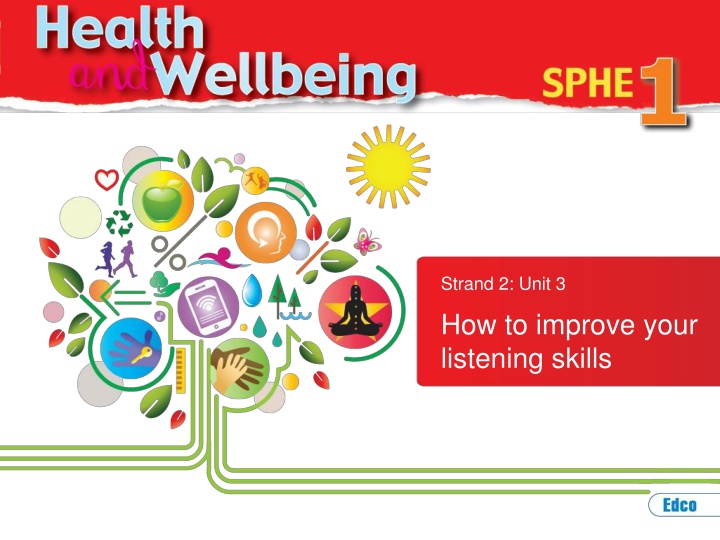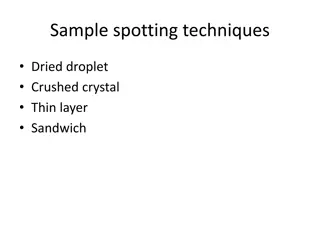
Effective Strategies for Enhancing Listening Skills
Learn how to improve your listening skills by understanding and dealing with different types of listeners - from the preoccupied to the interrupters. Discover practical tips to engage effectively and communicate better in various situations.
Download Presentation

Please find below an Image/Link to download the presentation.
The content on the website is provided AS IS for your information and personal use only. It may not be sold, licensed, or shared on other websites without obtaining consent from the author. If you encounter any issues during the download, it is possible that the publisher has removed the file from their server.
You are allowed to download the files provided on this website for personal or commercial use, subject to the condition that they are used lawfully. All files are the property of their respective owners.
The content on the website is provided AS IS for your information and personal use only. It may not be sold, licensed, or shared on other websites without obtaining consent from the author.
E N D
Presentation Transcript
Strand 2: Unit 3 How to improve your listening skills
The Preoccupieds These people come across as rushed and are always looking around or doing something else while you are talking to them. They cannot sit still and listen.
The Preoccupieds TIPS If you are a Preoccupied listener, make a point of setting aside what you are doing when someone is speaking to you. If you are speaking to a Preoccupied listener, you might ask, Is this a good time? or say, I need your total attention for just a moment. Begin with a statement that will get their attention, be brief and get to the bottom line quickly because their attention span is short.
The Interrupters These people are always ready to jump in. They are always waiting for a break to complete your sentence for you. They are not listening to you. They are focused on trying to guess what you will say and, more important, what they want to say next.
The Interrupters TIPS If you are an Interrupter, make a point of apologising every time you catch yourself interrupting. This will make you more conscious of it. If you are speaking to an Interrupter, when they jump in, stop immediately and let them talk, or they will never listen to you. When they have finished, you might say, As I was saying before to bring their interruption to their attention.
The One-up-man This type of listener only listens long enough to get the gist of your story so that they can tell you a better one about someone they know who had a similar story but, of course, much, much worse than yours.
The One-up-man TIPS If you are a One-up-man , remember that everyone s story is important to them and no one wants to hear about someone else s story if it makes little of theirs. Watch it and stop it! If you are speaking to a One-up-man , try explaining that hearing about someone else, at this time, is not helping you and that you need to work this out for yourself.
The Battler These people are armed and ready for war. They enjoy disagreeing with and blaming others. Every conversation turns into an argument.
The Battler TIPS If you are a Battler , make an effort to put yourself in the speaker s shoes and understand, accept and find merit in another s point of view. If you are speaking to a Battler , when he or she disagrees or blames, look forward instead of back. Talk about how you might agree to disagree or about what can be done differently next time.
The Let me tell you what to do-ers These people constantly take the role of counsellor or therapist, and their main interest is in telling you how to sort out your problems. They think they are great listeners and love to help. They are constantly in a What you should do is mode.
The Let me tell you what to do-ers TIPS If you are a Let me tell you what to do-er , relax and understand that not everyone is looking for an answer, solution or advice. Some people just like bouncing ideas off other people because it helps them see the answers more clearly themselves. If you are speaking to a Let me tell you what to do-er , you might begin by saying, I just need to run something by you. I m not looking for any advice.
The Engagers These are the consciously aware listeners. They listen with their eyes, ears and hearts and try to put themselves in the speaker s shoes. This is listening at the highest level. Their listening skills encourage you to continue talking and give you the opportunity to discover your own solutions and let your ideas emerge.
The Engagers TIPS If you are an Engager , keep it up. People truly appreciate this about you. If you are speaking to an Engager , take the time to acknowledge their attentiveness. Thank them for their interest in you and for listening.






















